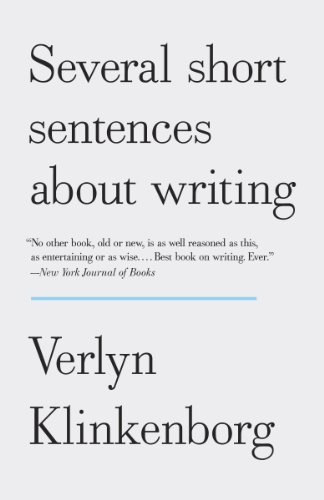Watching a prose performance (which is to say, reading) I sometimes wonder how long the author can keep it up. A biographer of Hart Crane (about which book I wrote here) said of his sentences, “we watch with mingled horror and embarrassment as he flings himself form another syntactic precipice,” and its something like that for me. When I began reading Verlyn Klinkenborg’s Several Short Sentences about Writing, I thought the same. It’s so graceful, so winsome, so wise; when will it crash into a tragic heap?
Sometimes a book doesn’t and I walk back into the world mouth agape, sun-struck. Annie Dillard’s Pilgrim at Tinker Creek is this way. Smart on the topic of writing, observation, nature, and human living, it is also spun out like filament, like one of those long-held notes on a violin one expects to end at the bow’s edge but doesn’t. We’re just sent off into space, stupefied. Francis Spufford’s Unapologetic felt likewise. After the introduction’s linguistic bite, I thought: okay, that’s a good idea. Load all the ore up front and readers will be so dazzled, so drunk, they’ll sing through anything else you throw at them. But it didn’t stop. Line after line, Image after image of prismatic, gem-like perfection shone out, page after page until I stopped wondering. It’s one of the most incredible demonstrations of what’s possible in English prose I know.
In the case of V. K., which is still the most useful book about writing I’ve seen, the answer is: he can keep up the high-wire act until page 150. It is unalloyed gold until that point, and then, the bow’s edge, the alloy, the filler, the frame.
I had the same thing happen to me recently with a book about writing poems. Glynn Maxwell’s On Poetry struck me like none of the many I’ve read in that genre. His examples about what poetry is, what it does, what it does not do are both convincing and authoritative. He puts down so compellingly and completely all arguments about slam poetry and song lyrics (over which I wandered into dust-up with Michael Robbins, who now sends me hate mail, thanks to this post) with a finality that stopped me cold. “It would be nice,” he writes, knowing he’s right, “never to be asked about this again.” Maxwell had me entirely in his trust. And then, (having grown tired of theorizing? Having come up against a deadline?) he stopped talking about poetry, what it is and what it does, and started talking about a particular section of his creative writing workshop. The students’ names, their lusts, their contributions to the course are writ out like we were suddenly in a novel about graduate school. He gives away lesson plans and it turns into a teaching manual. I was distressed, seeing it. Like an athlete who stays in the game too long, the late, sad images struck out the glowing, golden prime. I was left not with a lasting artwork about the discipline, but with something messy, and unappealing, and a bunch of broken promises, like life…
Klinkenborg got me going again. Made a believer of me. But the p. 150 disaster is total. There, he stops writing his engaging, lovely notes on writing. Instead, he quotes long paragraphs of writers he admires. Gone is his whiskey-smooth, Hemingway-esque advice. In its place, a scan of his commonplace book. They’re good scans, mind you. It’s nice he admires Ruskin, and Joan Didion as stylists, but I was busy admiring Klinkenborg as a stylist. I have my own Valhalla and I was just putting up the bunting to induce him therein when we parted company: he to go make a cup of coffee, and I to piss and moan here. It turned his thoughtful book on writing into some very thoughtful observations about writing, and an anthology of neat-o paragraphs. That would be fine except I was just (weren’t we all?) disappointed by Stanely Fish’s How to Write a Sentence, which purported to be about, um, how to write a sentence, but was actually a collection of his favorite sentences from English Literature, followed by interjections like “wasn’t that great?” and “did you see what she did there?”
Some things I’d like to remember from VK’s miscellany though, which again, is marvelous and worth it.
Revision Strategies
Revise toward brevity—remove words instead of adding them.
Toward directness—language that isn’t evasive or periphrastic.
Toward simplicity—in construction and word choice.
Toward clarity—a constant lookout for ambiguity.
Toward rythym—where its lacking.
…
Toward variation—always.
Toward silence—leave some.
Toward presence—the quiet authority of your prose.
or this:
Here’s another way to make your prose less familiar. Turn every sentence into its own paragraph. What happens? A sudden, graphic display of the length of your sentences and, better yet, their relative length—how it varies, or doesn’t vary, from one to the next. Variation is the life of prose, in length and in structure.
or this:
How many sentences begin with the subject?
How many begin with an opening phrase before the subject? Or with a word like “when” or “since”or “while” or “because”?
How many begin with “there” or “it”? How many of the verbs are variants of “to be”?
Many people assume there’s an inherent conflict between creativity and a critical, analytical awareness of the medium you work in. This is nonsense.
and perhaps most valuable:
There is no such thing as writers’ block.
There’s loss of confidence
And forgetting to think
And failing to prepare
And not reading enough
And giving up on patience
And hastening to write
And fearing your audience
And never really trying to understand how sentences work.
Above all, there never learning to trust yourself or your capacity to learn or think or perceive.
I can’t copy out any more. Go buy this book. I have some writing to do.

